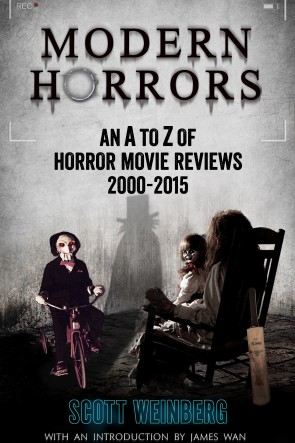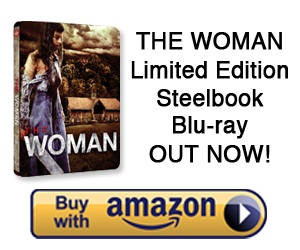Bernard Rose: From Candyman to Frankenstein{0}
“My films have gone from cult to classics without ever passing through success.”
Bernard Rose has never been one for genre labels, having directed films as diverse as Immortal Beloved, Mr. Nice and Ivansxtc. But, as his early films Paperhouse (1989) and Candyman (1992) proved, he knows a thing or two about the horror genre. With his latest film, a present-day adaptation of Mary Wollstonecraft Shelley’s Frankenstein, he not only returns to the genre that gave us one of the most iconic horror monsters of the modern age (Candyman), but re-teams with Tony Todd, the actor who played him. And guess what? Frankenstein is really good. (Read our review here.)
In this exclusive interview, he talks about the film – and names his own favourite horror films, some of which you never even knew were horror films…
You’ve carved out quite a niche for yourself lately, adapting classic 19th century novels in innovative ways. What made you tackle Frankenstein? Were you afraid there weren’t enough adaptations out there already?
There weren’t enough – that was exactly my problem! [Laughs] No, but when I read it, I found the chapters where the monster tells his story very moving, and I thought, “We’ve never seen a movie from the monster’s point of view.” The whole thing about waking up in a laboratory, and he doesn’t know who he is, what he is or where he is… I just thought that was a very powerful dilemma and very moving, especially in a modern context because it’s what happens to all of us in a sense. We don’t know anything, and we’re suddenly thrown into a world that’s hostile, and we’re having all these feelings inside that we can’t quite communicate, and the world vests its disappointments on us, and I thought nobody had really done it like that.
Xavier Samuels plays the monster, ‘Adam’, in your version, and he’s extraordinary. He really begins life as a mewling infant…
He is an infant, but he has an accelerated infancy, and my feeling by the end was that he was a slightly unhappy teenager. And he tries to get laid and it goes wrong – all the things that happen when you’re a teenager.
And he finds a surrogate father figure in the blind beggar, ‘Eddie’, played by Tony Todd.
Obviously the blind beggar is a very important character in the novel and the movie –and also played very memorably in Young Frankenstein where Gene Hackman plays the blind beggar, which is possibly one of the funniest things I’ve ever seen.
How did you end up casting Tony in the role?
Because Adam was going to end up on Skid Row in downtown LA, I decided to make [the blind beggar] a blues singer, and I needed someone to do the part who could sing as well, and I thought about Tony, and asked him “Can you sing and play guitar?” and he said yes. And of course he didn’t at all – he’s not a musician in any sense. [Laughs] But he did an amazing job, and that’s him singing – he’s doing it live, not miming to any backing track – and he really put it across. Tony brings so much humanity and depth to what he does, and I think he’s just wonderful in the film. He’s a real actor, Tony: I saw his one-man show, which was fantastic, there’s so much he can do.
Tony told me he’s going to make his directorial debut, Providence, soon, and I was wondering if he’d end up borrowing a few tricks from you – like the way you operate your own camera.
I usually operate camera – at least in the last twenty years exclusively pretty much, and especially with a thing like Frankenstein where I’m allowing actors to improvise. I think it’s much more personal, and it keeps everything fresh and dangerous. Sometimes directors are off in a video village watching television, whereas if I’m physically a part of it, I can screw up too, you’re in there with the actors, and it feels like more of a collaboration in some ways. I think it makes it easier for the actors, because you’re closer to them.
Do you think that’s one of the things that appeals to Danny Huston? You seem to cast him in everything.
Pretty much what happens is that Danny will say yes whatever it is, which is a great advantage. To be honest, I’ve done a lot of work with Danny but it’s mostly because I write a lot of debonair men and he’s one of the few actors who can pull that off! I have a great time with Danny, although we do argue.
I first became aware of your work in Paperhouse, which I watched again recently and was delighted to discover really holds up well. I think people should watch it before they remake it and fuck it up.
There have been quasi-remakes, in all kinds of genres, the film Mirrormask that Neil Gaiman did, and there was also The Lovely Bones that has a lot of things in it that come from Paperhouse I think. I had a screening of the film recently; I found this great 35mm print, and to see it again on a big screen, there’s no dirt or anything on it, and it’s lovely to see things exactly the way you made them back in the day.
After Paperhouse, you created one of the great horror icons, Candyman. Are you surprised how popular that character has become?
It took a while. It was successful when it came out, but it wasn’t huge, and I think it’s one of those things that over time people have taken to heart. The thing that’s upsetting for me is that I think my films have gone from cult to classics without ever passing through success, and although it’s not quite true of Candyman, it’s somewhat true.
Frankenstein is far from a horror movie; it hews more towards the interesting adaptations of classics that you’ve been doing, and I hear you’re doing another of what Tony Todd calls the ‘Dead Poets Society’ films?
[Laughs] That’s funny, that’s actually true. I’ve written a film that I want to make that’s an update of a classic 19th century text, and it’s going to be extremely visceral and horrific and surprisingly topical considering it was written in the 1840s.I’ll be running to Wikipedia to see if I can guess. (Editor’s note: Jack Sheppard? The Count of Monte Cristo? Varney the Vampire? Wuthering Heights!?)
If I told you’d guess but you wouldn’t guess how I’d adapt it, because you’d never know.
With your Frankenstein, the fidelity of it sneaks up on you, when Adam is out in the world, and you start hearing Shelley’s words, you realise how faithful it is.
I think that’s what I wanted to do very much, that’s what I was going for: that he speaks like Lord Byron, he’s not grunting and groaning, and it would be difficult to have him speak like that in the flesh, so I thought he could have this inner voice that he uses to express himself.
Although you’re not a horror director per se, you certainly know the genre. So I have to ask: what are your favourite horror films?
Obviously one always tends to like the films one saw at the peak age for viewing horror films, which I think is between 12 and 15, and the ones that I remember and absolutely loved was the Ken Russell film The Devils. It’s not strictly a horror film but it’s horrific from start to finish. And I guess from the same era I really loved The Tenant, the Polanski film, which is terrific – powerful and creepy and moving. Obviously the ones everybody knows, The Shining and The Exorcist, the pillars of the genre. And look at who’s making these movies: Polanski, Kubrick, Russell and obviously Hitchcock belongs in that company too. Don’t Look Now is of course right up there as an absolute masterpiece of the genre. And these are the best filmmakers there are, and they’re attracted to the genre for the same reason that I am, which is that it’s a genre that’s purely cinematic and, like comedy, it’s judged by how viscerally you can affect an audience. You can come out of a drama and say, “I’m not sure about that,” and then you read a review and see that it won fifteen Oscars, and you go, “Well, maybe I’m wrong.” But a horror film… if you weren’t scared, it’s no good. But nobody came out of Don’t Look Now without being creeped out. Nobody.I really do believe that my favourite horror films, or the best horror films, don’t have any ambitions to be horror films: Ingmar Bergman made horror films – Hour of the Wolf is a horror film. And I think that’s what’s so great about those movies is that they transcended their original ambitions and those are the people who really expanded and invented the cinematic form, and often the purest examples of when they were doing it was when they were trying to get that visceral reaction. I mean, even in the second half of Fanny and Alexander with the evil priest and the burning to death, there are some wonderful creepy, creepy things in that film. For years, people were embarrassed to say that something was a horror movie, but I’m sorry: Hour of the Wolf is a horror movie. The Tenant is a horror movie. I don’t know how else you would describe them.
Repulsion too, really.
That’s why those two films are so terrifying – they’re about the idea of losing your mind. And so is Hour of the Wolf, that’s exactly what that’s about. The Devils is an odd one because the whole thesis of the movie is that the demonic possession isn’t real, but then in a weird way I think Ken is going a bit further to explain that humans have created Hell on Earth, and that’s what they do in the movie.
Maybe we should do a feature about horror films you didn’t know were horror films. Like Haneke’s Amour…
Amour would scare the bejeezus out of you.
…and We Need to Talk About Kevin.
That is a horror movie. And Lars von Trier makes horror movies, openly with The Kingdom which is in my opinion one of his best films, but obviously Antichrist is a horror movie – what else would you call it?
Despite all these great directors working in the genre, I’m not sure the stigma of making horror films ever really went away.
That’s true. But, you know, a film like Carpenter’s Halloween, which has had so many imitators you can’t really watch it in a pure way, but if you were to sit down and watch that in a theatre, it’s probably one of the purest cinematic experiences that has ever been conceived, because it’s really just about a bunch of kids walking around suburbia, and it’s terrifying, from start to finish. It’s a wonderful, wonderful film.
Frankenstein is on UK DVD from February 22.








